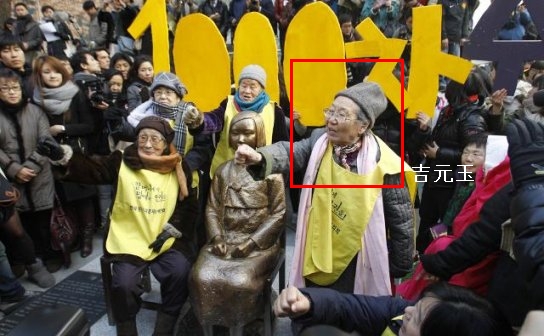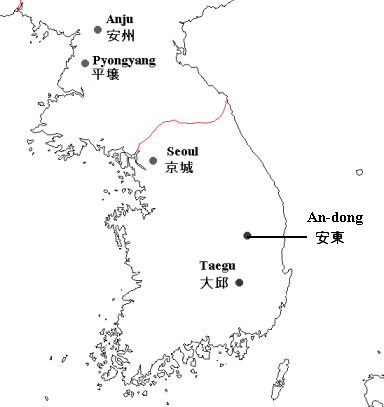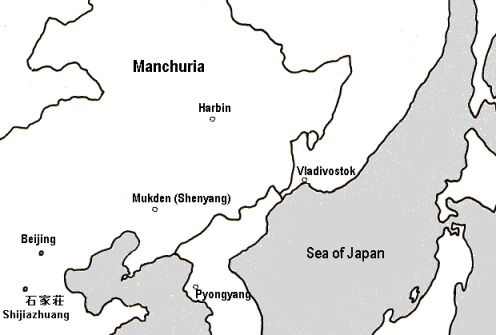

She actively participates in the Wednesday Demonstration that demands official apology and compensation from Japan. On November 28, 2014, in a press interview held at Paris, France, she asked the ghelp of the French people to solve the issue of the Comfort women.h Is she entitled to such apology and compensation?To the best of my knowledge, the following is the only written testimony regarding her life. It seems that editors were involved to compile the tape-recorded testimony of Kil Won-ok.
Memory for the Future II Publisher Akashi Shoten Co., Ltd. Publication 2010 Remarks The applicable part of the original text is available by clicking here.
According to the above written testimony, the story of her life goes as follows.
Kil Won-ok was born in 1928 in Pyeonganbuk-do, a province of present-day North Korea bordering Liaoning Province of China. In her early childhood, she found herself in a family of seven in An-dong. She had two elder brothers, one elder sister, and one younger brother. Her father was an antique dealer by profession and her mother was a fishmonger.
Her days of school learning had come to an abrupt end one day when her father was arrested and charged with selling stolen items. The subtitle of the description says gIn order to pay the fine, she was sold for 20 sen (1/5 of a yen).h She says gSomeone seems to have put me in the Kisaeng School to make me receive kisaeng training because I would become a kisaeng anyway.h She says it was when she was 12 or 13-years-old.
At the age of thirteen, she went to Manchuria with her friends in the Kisaeng House to earn money. gI got an injury on the right thumb and become unable to play the Chang (a traditional musical instrument) anymore. So I talked with a woman in the Kisaeng School and decided to go to Manchuria. Ifm not sure whether I was sold or not sold. But at the age of thirteen, I decided to stop the kisaeng training to go to Manchuria. It was a cold place, very cold. I was scared of an elderly woman who employed me at the brothel.h
At the age of fifteen, she got infected with a venereal disease called bubo. gI got a bump on both sides of my groin. I received a surgical treatment to take them out. As I was unable to work anymore, I returned home. A Korean man accompanied me in my journey to home. At that time nobody can move to China or Manchuria at will without identification such as family register. I remember that a woman called a gpimpf showed an identification certificate and I was out.
After returning home, she endured the poverty. gMy mother got meager income by selling fish. My elder sister was already married a man and gone. My father has just got out of the jail and still unable to work. We were very poor. We ate millet day after day.h
One day she met with her friends who learned to be a kisaeng at the Kisaeng School and decided to go to Northern China again. gI talked with them about this and that and someone said you can earn a lot if you go there. I determined not to go to such a place but went there again. I am a dammed fool. I cannot remember the precise name of the place. Namakkachan? Shokachan? (The footnote of the description says it is Shijazhuang ÎÆ). The name of the brothel was Tokiwa and my name there was Yoshimoto Hanako. Japanese soldiers bought tickets at the entrance and select his favorite girl in the hall. After having sex in a room, we come to the hall and sit on a chair, waiting to be selected again. The collected tickets had to be returned to the entrance. It was a hard life. Short ones were easy but long ones irritated me. gWhen you face life or death, you gonna do it for a long time. Some soldiers hit me hard when I resisted. I hated long ones.h@One day, she learned the death of her father. gI think it was 1934. By that time, I received letters notifying me of his serious conditions. I said I want to go back home but the operator yelled at me. eWhat are you saying? If you go back home, when you come back here?f Donft you think you want go back home if your parent died? I wept. Time passed by in that way and there came the end of the war on August 15.h
After coming back to Korea by a ship at Inchon, she worked at a hostess bar for about three months and then married a man. gHe was a yakuza. Once he leaves the home, he doesnft come back home for ten days, sometimes even for a month. When he comes back home he brought a women and debt with him.h She endured the unfortunate married life for the next five or six years and finally left the home.
She lived as a hostess at a bar and as a street vendor thereafter. Due to hysterectomy she received, she could not give birth to a child. She adopted a child at the age of thirty and raised him. He graduated from a theological university and became a pastor.
Her wish is somebody extends sincere apology to her tarnished life. gWhen I was a little girl and know nothing in the world, I thought my suffering has come from the poverty and wished to be born in a wealthy family. But now after reaching an old age I think differently. Even today some Koreans do bad to earn money. They trap people who have nowhere to go. Giving consent to the trick seems to have made me suffer that much.h


Thatfs all the author could discern from the description.
Now the author has big questions. Is Japanese Imperial Army or Authority responsible for her going to Manchuria or Northern China? Was there forced recruitment of her by the Japanese Imperial Army or Authority?
Absolutely No!
 To Top To Top |
 To Home To Home |